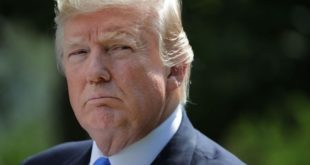Several protesters have been arrested while trying to run from a Hong Kong university campus surrounded by police.
A group of around 100 people tried to leave Polytechnic University, but were met with tear gas and rubber bullets.
It is the third time protesters have tried to leave, following a violent and fiery overnight stand-off with police.
In the past week, Polytechnic University has turned into a battleground as the long-running Hong Kong protests become more violent.
Meanwhile – as protests were raging – a Hong Kong court ruled the government’s anti-mask law unconstitutional.
In October, the government invoked a colonial-era emergency law to make wearing masks illegal – but protesters largely defied the ban.
What is happening now?
At around 13:45 local time, around 100 protesters tried to run from the campus but were met by police trying to arrest them.
Images showed protesters pinned down by officers amid clouds of tear gas.
Police officers had earlier said protesters could leave the campus via another exit – the Cheong Wan Road South Bridge – but urged them to drop their weapons and remove their gas masks.
But pro-democracy lawmaker Ted Hui – who is on the campus – said the bridge had “been sealed off”, and it was not possible to leave this way.
Mr Hui earlier said there were up to 1,000 protesters on the site.
Protesters also attempted to leave the campus just after sunrise, but were met by tear gas and rubber bullets.
Police said the gas was fired because “a large group of masked rioters…suddenly charged at cordons”.
Earlier, at around 05:30, protesters threw petrol bombs and lit fires when police tried to enter the campus.
According to Mr Hui, many on campus are injured, and staff from the Red Cross were later seen entering the site.
The acting president of PolyU’s student union Ken Woo said fresh water was available, but food supplies were running low.
Earlier, the head of the university, Professor Jin-Guang Teng, released a video statement to protesters, saying he had arranged a deal with the police.
If protesters left peacefully, he said he would “personally accompany” them to the police station where he would “ensure your case is fairly processed”.
What happened overnight?
PolyU has been occupied by protesters for several days. On Sunday night, police warned protesters they had until 22:00 local time (14:00 GMT) to leave the campus.
Some left, but others stayed, throwing petrol bombs and bricks at police and even firing arrows from bows.
Police warned they could use live ammunition if the attacks continued.
The BBC’s Gabriel Gatehouse, who was at the scene, said there was a game of “cat and mouse” with police.
“The police fire tear gas and the water cannon advances, squirting noxious blue liquid,” he said.
“The protesters, crouching behind umbrellas, respond with petrol bombs and rocks fired from improvised catapults. The police vehicles retreat. The net result is zero.”
A statement from the university on Sunday night said it had been “severely and extensively vandalised”.
Who are the protesters left inside?
In interviews with media, a number of them identified themselves as current students.
But it is unclear now how many of those left on the PolyU campus are, in fact, university students.
The protesters earlier appealed for university alumni and others sympathetic to the cause to join them as reinforcements.
How did we get here?
Campuses remained relatively free of violence during the Hong Kong protests. But earlier last week, the Chinese University of Hong Kong became a battleground.
Police said protesters threw petrol bombs on a major road near the university in an effort to stop traffic. Officers attempted to reclaim the road, leading to major clashes.
The university then cancelled all classes for the rest of the term.
Days later, protesters at PolyU also tried to block access to a key tunnel near the university.
“We occupied the streets next to the campus because it’s the Cross Harbour Tunnel,” one 23-year-old protester told NBC News.
“If we could first jam the traffic, then people couldn’t go to work and the economy in return would suffer.”
On Monday afternoon the city’s Hospital Authority said 24 people aged between 16-84 were injured, with four in serious condition across Hong Kong.
Some 13 people, aged between 22 and 57, were injured on Sunday, with one in serious condition.
It is unclear how many of the injured were protesters at the university.
Why are there protests in Hong Hong?
Hong Kong – a British colony until 1997 – is part of China under a model known as “one country, two systems”.
The protests started in June after the government planned to pass a bill that would allow suspects to be extradited to mainland China.
Many feared this would undermine the city’s freedoms and judicial independence.
The bill was eventually withdrawn but the demonstrations continued, having evolved into a broader protest movement against alleged police brutality, and the way Hong Kong is administered by Beijing.
BBC
 Home Of Ghana News Ghana News, Entertainment And More
Home Of Ghana News Ghana News, Entertainment And More





